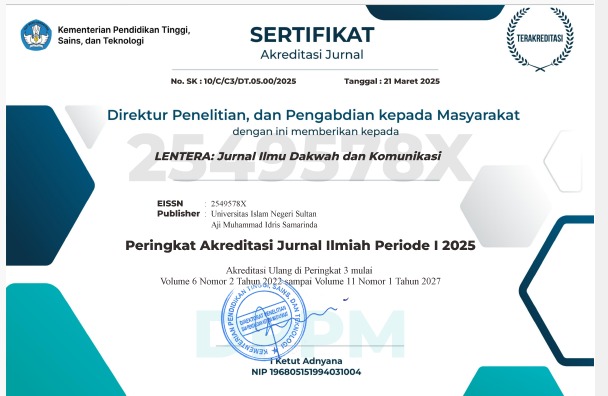Influence and Problems of Da'wah for the Preachers In Facing the Challenge of Modernization
Abstract
This article wants to explain the influence and problems of da'i for preachers in facing the challenges of modernization. Da'wah challenges in the modernization era will be increasingly difficult and complex both internally and externally. This challenge arises in various forms of modern society's activities, such as behavior in obtaining entertainment, tourism and art in a broad sense, which increasingly opens up opportunities for moral and ethical vulnerabilities to emerge.This research is a type of qualitative researchwith the library research approach as well as empirical social facts contained in the object under study and data collection techniques in the form of observation to see things that happen in the midst of society, then interpretation is carried out to draw conclusions. The results of this study explain that da'wah activities must be able to have a positive impactarising from the da'wah process. These impacts can be cognitive, affective and behavioral. Cognitive aspects can occur if there is additional knowledge, insight from the da'wah partners, affective aspects can take the form of feelings of pleasure, displeasure, likes and dislikes and changes in attitude, while behavioral aspects take the form of changes in behavior in accordance with the goals of da'wah.
References
Arifin, Isep Zainal, (2009). Bimbingan Penyuluhan Islam; Pengembangan Dakwah
Melalui Psikoterapi Islam, Cet. I; Grafindo Persada; Jakarta.
Agarwala, R., Mishra, P., & Singh, R. (2019). Religiosity and Consumer Behavior:
a Summarizing Review. Journal of Management, Spirituality & Religion, 16(1), 32–54.
https://doi.org/10.1080/14766086.2018.1495098
Aripuddin, Acep, (2011). Penegembangan Metode Dakwah; Respon Dai Terhadap
Dinamika Kehidupan Beragama Dibawah Kaki Ceremai, Cet. I, Jakarta; CV. Raja
Grafindo Persada
Ahmad, Mubarok, (1999). Psikologi Dakwah, Penerbit Pustaka Firdaus
Basit, Abdul, (2006). Wacana Dakwah Kontemporer, Yogyakarta: STAIN Purwokerto
dan Pustaka Pelajar
Braam, A. W. & Koenig, H. G. (2019). Religion, Spirituality, and Depression in
Prospective Studies: A Systematic Review. Journal of Affective Disorders, 257, 428–438.
https://doi.org/10.1016/j.jad.2019.06.063
Castrawijaya, Cecep., (2023), “Da’i Technology Literacy in Perspective of the Qur'an,”Volume 17 Nomor 1, Ilmu Dakwah: Academic Journal for Homiletic Studies,
https://journal.uinsgd.ac.id/index.php/idajhs/article/view/25807/9176
DOI: 10.15575/idajhs.v17i1.25807 El-
Banthory, Ibnu Qomar dkk. (2010). Peta Dakwah Di Indonesia, Edisi Pertama. Pamulang; Formadia Press
Fahrudin, Mohammad Rindu Fajar Islamy., 2022, “Da’i (Muslim Preachers) Idols,
Fatwas, and Political Constellations: Empirical Study of Millennial Generation
Perspective” Jurnal Dakwah Risalah, Vol 33, No. 2 Desember https://ejournal.uin-suska.ac.id/index.php/risalah/article/view/23277/9302
Guleng, M. P.,Muhamat@Kawangit, R.,& Usman, A.H. (2019). A Case Study Of
Islamic Da'wah Activities in Corderilla Administrative Region, Phillipines, Among Muslim Minority. Humanities & Social Sciences Reviews, 7(4), 559–571. https://doi.org/10.18510/hssr.
Hasan, Muhammad Tholhah, (2005). Ahlusunnah Waljamaah; Dalam Presepsi dan Tradisi NU, Cet.III, Jakarta; Lantabora Press
Jumantoro, Totok, (2001). Psikologi Dakwah; Dengan Aspek-aspek Kejiwaan yang Qurani, Edisi Pertama, Jakarta; Amzah.
Jassad, Usman, (2012). Dakwah dan Komunikasi Transformasi; Mencari Titik Temu Dakwah dan Realitas Umat, Edisi Pertama. Makassar: UIN Alaudin Makassar
Jufri, Ahmad Mudzofar, (2013). Problem Dakwah: Internal Sebelum Eksternal; http://www. Facebook. com/Ustadz Ahmad Mudzoffar Jufri, diakses pada tanggal 30 Mei
Munawwir, Ahmad Warson, (2002). Kamus al-Munawwir, Surabaya: CV. Pustaka Progresif.
Muis. A, (2001). Komunikasi Islam, Bandung: Remaja Rosdakarya
Mubarok, Muh. Azhar, (2022), “Preachers' Perspective About Content Manipulation for Da’wah on Social Media”,
Jurnal Lentera, Vol VI, No. 1 Juni
https://journal.uinsi.ac.id/index.php/lentera/article/view/4570/1996
Pangaribuan, Tigor, (1997). Kamus Popular Lengkap, Edisi Kedua, Bandung; CV. Pustaka Setia
Pimay, Awaludin, Uswatun Nismah., (2021),“The Urgency of E-Da’wa in The Digital Age”,
Jurnal Lentera, Vol V, No. 2 Desember, https://journal.uinsi.ac.id/index.php/lentera/article/view/3921/1535
Pimay, Awaludin, (2022), “Building Awareness about Multicultural Society through Da’wa bi al-Hikmah” Jurnal Lentera, Vol VI, No. 2 Desember, https://journal.uinsi.ac.id/index.php/lentera/article/view/5822/2307
Rahmat, Jalaluddin, (2005). Psikologi Komunikasi, Cet. XXII, Bandung; CV. Remaja Rosda Karya
Taufik, (2012). Etika Komunikasi; Komparasi Komunikasi Islam dan Barat,Cet. I, Bandung; CV. Pustaka Setia
Tahir, M., (2023), “Effective Da’wah (Proselytizing) in the Era of Society 5.0: The
Perspective of Students in Indonesian State Islamic Higher Education”., Jurnal Dakwah Risalah, Vol 34, No. 1 Juni https://ejournal.uin-suska.ac.id/index.php/risalah/article/view/23277/9302
Copyright (c) 2023 LENTERA

This work is licensed under a Creative Commons Attribution-ShareAlike 4.0 International License.
Penulis yang menerbitkan artikel di Lentera: Jurnal Ilmu Dakwah dan Komunikasi setuju dengan ketentuan berikut:
- Penulis memiliki hak cipta artikel dan memberikan hak jurnal untuk publikasi pertama dengan karya yang secara simultan dilisensikan di bawah CC-BY-SA atau The Creative Commons Attribution – ShareAlike Licence.
- Penulis dapat membuat perjanjian kontrak tambahan yang terpisah untuk distribusi non-eksklusif versi jurnal yang diterbitkan dari karya tersebut (misalnya, mempostingnya ke repositori institusional atau menerbitkannya dalam sebuah buku), dengan pengakuan atas publikasi awalnya di jurnal ini.
- Penulis diizinkan dan didorong untuk memposting pekerjaan mereka secara online (misalnya, dalam repositori institusional atau di situs web mereka) sebelum dan selama proses pengajuan, karena dapat menyebabkan pertukaran yang produktif, serta kutipan yang lebih awal dan lebih besar dari karya yang diterbitkan (Lihat The Effect of Open Access)
Authors who publish articles in Lentera: Jurnal Ilmu Dakwah dan Komunikasi agree to the following terms:
- Authors retain copyright of the article and grant the journal right of first publication with the work simultaneously licensed under a CC-BY-SA or The Creative Commons Attribution–ShareAlike License.
- Authors are able to enter into separate, additional contractual arrangements for the non-exclusive distribution of the journal's published version of the work (e.g., post it to an institutional repository or publish it in a book), with an acknowledgment of its initial publication in this journal.
- Authors are permitted and encouraged to post their work online (e.g., in institutional repositories or on their website) prior to and during the submission process, as it can lead to productive exchanges, as well as earlier and greater citation of published work (See The Effect of Open Access).












.png)
